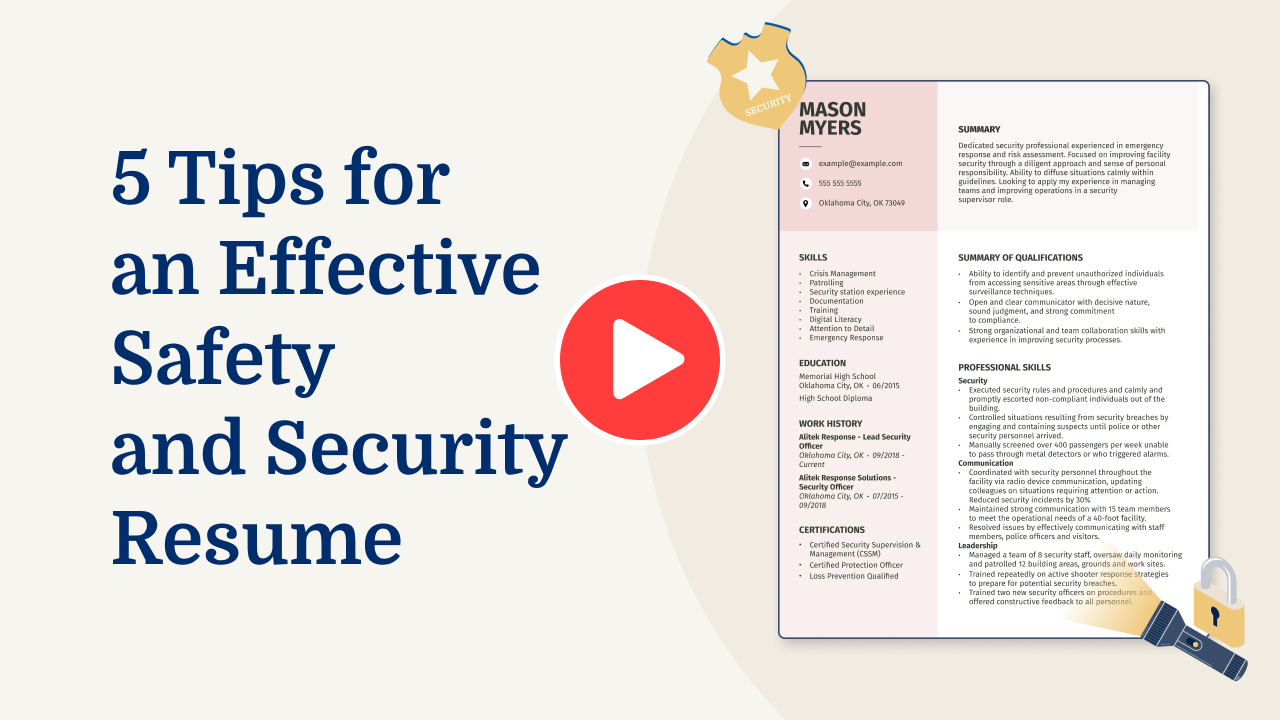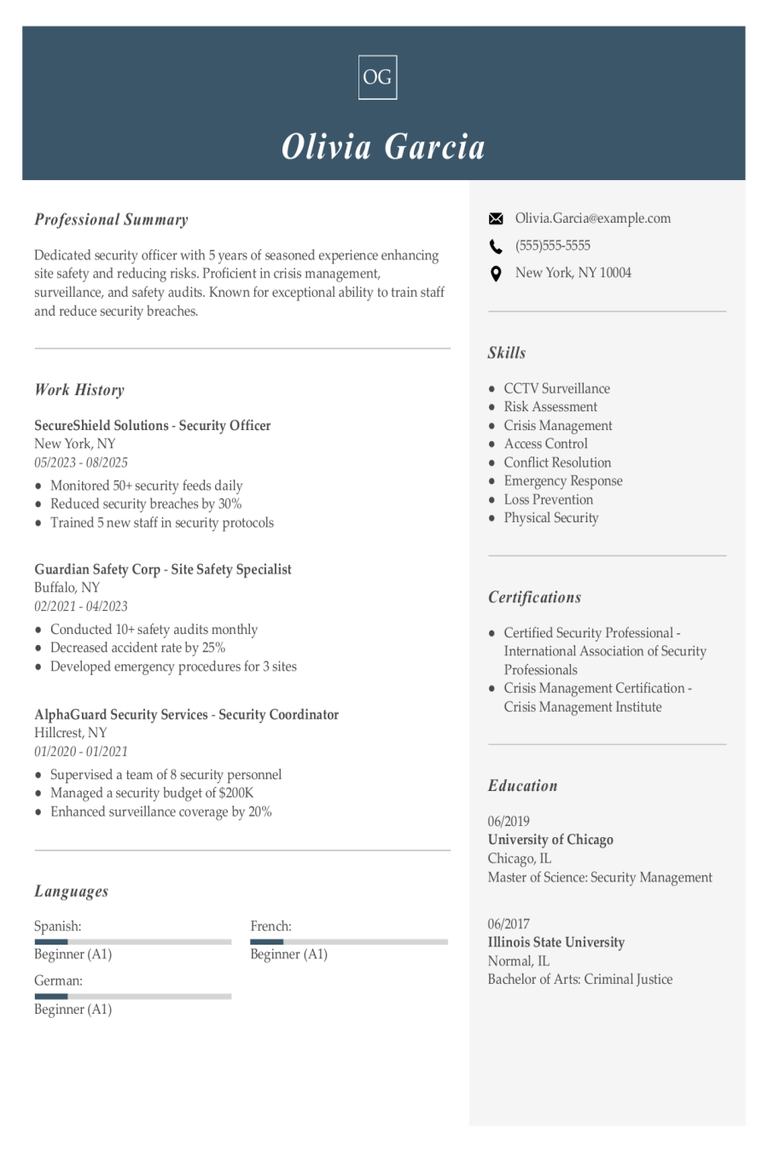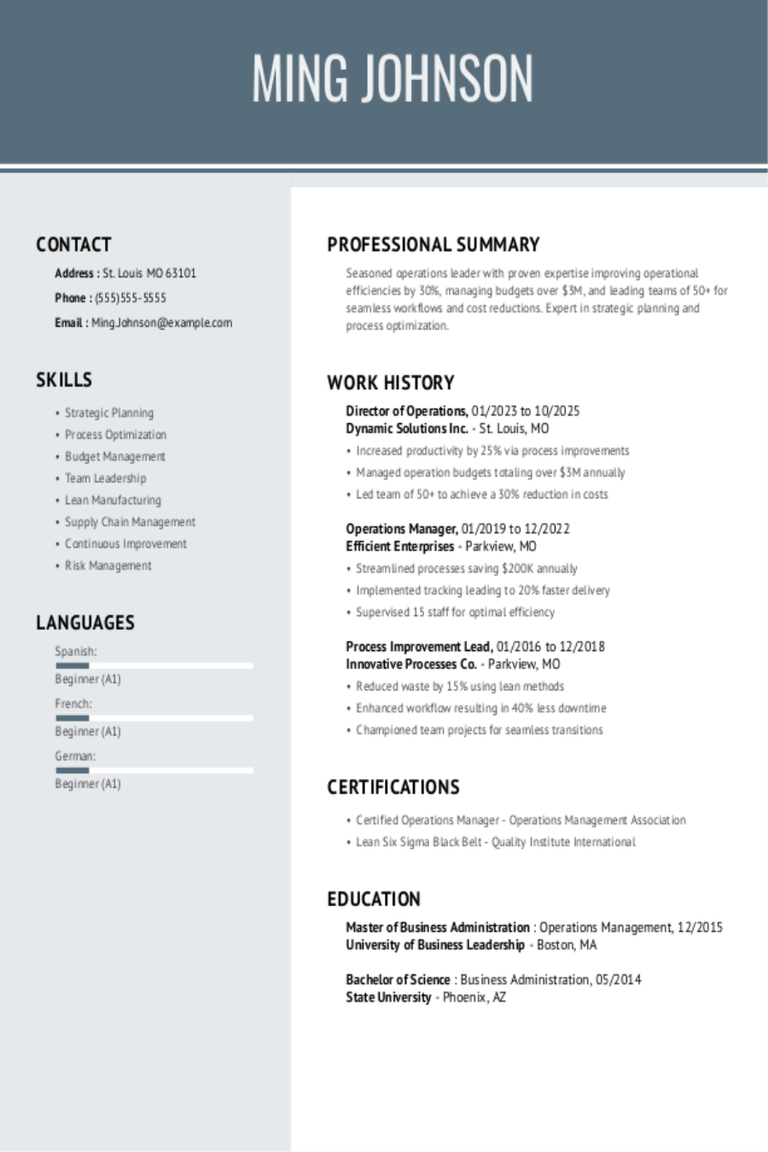Table of Contents
Get started with MyPerfectResume today!
- Build a resume on any device
- Pick an ATS-friendly template
- Tailor with AI copy suggestions
Why this resume works
- Quantifies accomplishments: Measurable accomplishments like reducing breaches by 25% highlight the applicant’s impact and value in security roles.
- Highlights industry-specific skills: Industry-specific skills, such as threat analysis and compliance auditing, reveal the applicant’s fit for security roles, effectively aligning with sector demands and showcasing valuable expertise.
- Illustrates problem-solving ability: Implementing new protocols to cut breaches by 25% exemplifies strong problem-solving skills through innovative strategies and critical thinking.
More Director of Security Resume Examples
Check out our director of security resume examples to understand how to showcase your leadership skills, crisis management experience, and strategic planning. These safety and security resume samples will help you craft a resume tailored for security leadership roles.
Chief Security Officer
Why this resume works
- Effective use of keywords: Weaving in specific keywords like “cybersecurity strategy” and “risk management” improves the resume’s chances of passing applicant tracking systems (ATS) and standing out to hiring managers.
- Puts skills at the forefront: Positioning skills like network security and incident response prominently mirrors the skills-based resume format, which is ideal for showcasing expertise early on.
- Centers on academic background: Highlighting degrees from Stanford and Berkeley, along with honors, draws attention to academic prowess—a smart focus when emphasizing foundational career achievements.
Risk Management Director
Why this resume works
- Points to measurable outcomes: Quantifying achievements like cutting incidents by 35% and achieving a 15% cost reduction annually showcases a powerful approach to risk management and operational efficiency.
- Demonstrates language abilities: Language skills in Spanish, French, and Mandarin support the applicant’s cross-cultural communication in global risk environments.
- Displays technical expertise: Holding certifications like Certified Risk Manager and Financial Risk Manager highlights a solid foundation of technical expertise, important for navigating complex risk landscapes.
Corporate Security Manager
Why this resume works
- Lists relevant certifications: Listing certifications like Certified Security Manager and Crisis Management Specialist signals a strong commitment to expertise and ongoing learning.
- Showcases impressive accomplishments: By highlighting achievements such as saving $200K and reducing incidents by 35%, the applicant shows significant business impact.
- Emphasizes leadership skills: Managing security for five major sites while leading a team illustrates an ability to apply leadership skills effectively across complex projects.
Director Of Security Resume Template (Text Version)
Daniel Wilson
Milwaukee, WI 53203
(555)555-5555
Daniel.Wilson@example.com
Professional Summary
Experienced Director of Security adept at implementing robust security strategies. Proficient in risk assessment and crisis management with demonstrated success in reducing breaches. Exceptional team leadership and incident response skills.
Work History
Director of Security
SecureTech Solutions – Milwaukee, WI
June 2023 – August 2025
- Implemented new protocols, reducing breaches by 25%
- Led a team of 20 security analysts efficiently
- Developed crisis management plans increasing readiness by 40%
Security Operations Manager
CyberGuard Corp – Brookfield, WI
January 2021 – June 2023
- Improved response time by 15% for security threats
- Managed budget cutting costs by 18% efficiently
- Monitored and enhanced network security protocols
Security Supervisor
TechShield Inc – Milwaukee, WI
January 2020 – January 2021
- Conducted risk assessments raising safety by 30%
- Trained staff improving incident response by 10%
- Oversaw daily operations ensuring maximum efficiency
Languages
- Spanish – Beginner (A1)
- French – Intermediate (B1)
- German – Beginner (A1)
Skills
- Network Security
- Threat Analysis
- Crisis Management
- Risk Assessment
- Compliance Auditing
- Team Leadership
- Incident Response
- Security Training
Certifications
- Certified Information Systems Security Professional (CISSP) – ISC2
- Certified Ethical Hacker (CEH) – EC-Council
Education
Master of Science Cyber Security
University of Texas Austin, Texas
May 2019
Bachelor of Science Information Technology
Texas A&M University College Station, Texas
May 2017
Related Resume Guides
Advice for Writing Your Director Of Security Resume
This guide will help you navigate how to write a resume tailored to highlight your leadership skills, experience in managing safety protocols, and ability to safeguard organizational assets. Dive in and discover tips specifically designed for security professionals aiming for top-level positions.

Write a strong professional summary
A professional summary serves as a brief introduction at the top of your resume, helping hiring managers quickly grasp who you are as a job seeker.
It establishes the tone for your application and helps readers decide if they want to explore your background further. The choice between a summary and an objective depends on your career stage.
This professional summary is typically a three to four sentence overview highlighting your experience, skills, and achievements. It’s particularly suited for experienced applicants, such as those applying for director of security roles.
In contrast, resume objectives highlight what you aim to achieve in your career. They are effective for entry-level workers, career changers, or individuals with employment gaps. While summaries focus on “what I’ve accomplished,” objectives emphasize “what I aim to contribute.”
Next, we’ll provide examples of both summaries and objectives across various industries and experience levels to assist in guiding your own writing process. Explore our professional resume examples for additional inspiration.
Director of security resume summary examples
Entry-level
Recent graduate with a Bachelor of Science in criminal justice and a focus on cybersecurity. Holds CompTIA Security+ certification and has completed internships that provided foundational knowledge in security protocols and risk assessment. Eager to contribute to developing and implementing security strategies to protect organizational assets.
Mid-career
Seasoned security professional with over seven years of experience managing security operations for mid-sized enterprises. Proven track record in threat analysis, incident response, and team leadership. Certified Information Systems Security Professional (CISSP) with expertise in compliance management, network security tools, and crisis management planning.
Experienced
Veteran director of security with more than 15 years of experience spearheading comprehensive security programs for Fortune 500 companies. Expert in strategic planning, staff development, and implementing cutting-edge technology solutions to minimize risks. Recognized for transforming underperforming departments into proactive units delivering measurable improvements in safety and efficiency.
Director of security resume objective examples
Entry-level applicant
Aspiring director of security with a background in criminal justice and internship experience in corporate security settings. Eager to leverage analytical skills and risk assessment knowledge to contribute to a company’s safety protocols and improve its security framework.
Career changer
Detail-oriented professional transitioning from law enforcement to a director of security role, bringing extensive experience in investigation and crisis management. Looking forward to applying leadership abilities and strategic thinking to ensure comprehensive protection for organizational assets.
Security training graduate
Recent graduate from a certified security management program seeking an opportunity as a director of security. Committed to using newly acquired skills in threat analysis and emergency response planning to support effective security operations within a progressive organization.
Build a standout resume in minutes with our easy-to-use AI Resume Builder. Choose a professional template, add your details, and make a strong impression on employers.
Include relevant certifications and training
For a director of security, listing certifications and training is important because it shows expertise in managing and protecting systems. Certifications prove you have the skills needed to keep information safe from threats. They also help employers see that you’re up-to-date with the latest security practices.
It’s a good idea to create a special section for certifications on your resume so they stand out. Here are a few examples of relevant certifications for your resume:
- Certified Information Systems Security Professional (CISSP)
- Certified Information Security Manager (CISM)
- CompTIA Security+
- Cisco Certified CyberOps Associate
- Offensive Security Certified Professional (OSCP)
Having these certifications can make you more successful as a director of security because they show that you know how to handle complex security challenges. Employers will trust you to protect their data and systems better when they see these credentials. It also makes your resume stronger when listed along with your education.
Example of a certifications section
Certified Information Systems Security Professional (CISSP)
Issued by: International Information System Security Certification Consortium (ISC²)
Expires 2025
Certified Chief Information Security Officer (CCISO)
Issued by: EC-Council
Issued 2022
Certified Cloud Security Professional (CCSP)
Issued by: (ISC)²
Expires 2024
CompTIA Advanced Security Practitioner (CASP+)
Issued by: CompTIA
Issued 2023
Global Information Assurance Certification (GIAC) Security Essentials
Issued by: (ISC)²
Expires 2026
Pick a well-organized resume template that effectively showcases your skills and qualifications to stand out to hiring managers and recruiters in your field.
Showcase your work experience
Showing your work experience on a resume is key, especially for a director of security role. Employers want to see what you’ve done and how you can help them. Begin by listing your jobs in reverse chronological order. This means starting with your most recent job and working backward.
For each job, include the job title, employer name, location, and dates you worked there. Using clear language helps make your experience easy to understand.
Incorporating action words like “led,” “planned,” or “improved” makes your responsibilities stand out prominently. Share measurable results from your past roles as well. Instead of just stating that you managed a team, mention that you led a team of 10 people who reduced security breaches by 30%. This demonstrates exactly what you accomplished and gives a sense of scale to your achievements.
Include core duties relevant to security work, such as managing security operations, developing safety protocols, overseeing emergency response plans, and coordinating with law enforcement. By focusing on these areas and using specific examples from your previous jobs, you’re not just telling employers where you’ve been; you’re showing them how you’d be an asset as their next director of security.
5 director of security work history bullet points
- Led a 15-member security team, improving response times to incidents by 40% through improved protocols and training.
- Implemented an advanced surveillance system, reducing unauthorized access attempts by 25% within the first year.
- Developed a comprehensive risk assessment program that decreased security breaches by 30% across all company sites.
- Collaborated with the IT department to integrate cybersecurity measures, resulting in a 50% reduction in data breaches.
- Streamlined emergency response procedures, cutting incident resolution time from 45 minutes to under 20 minutes on average.
Select a resume format that showcases your leadership skills, security accomplishments, and strategic planning experience as a director of security.
Match your resume with the job description
Tailoring resumes to job descriptions is essential because it helps job seekers stand out and successfully navigate applicant tracking systems (ATS). These systems scan for specific keywords and phrases from job postings, ensuring only the most relevant job seekers are considered.
An ATS-friendly resume uses these critical keywords and phrases that align with your skills. This strategy improves your chances of being noticed by hiring managers since your resume closely matches what they seek.
To find the right keywords, examine the job posting for repeated skills, qualifications, and duties. For instance, if you’re applying for a director of security position, look for terms like “risk management,” “emergency response,” or “security protocols.”
For example, instead of writing “Implemented safety measures,” you might say “Developed and implemented comprehensive security protocols to ensure workplace safety.” This approach ensures your content aligns with the employer’s needs.
Creating targeted resumes improves ATS compatibility by making sure your application meets the employer’s criteria. By choosing to customize your resume, you not only increase the likelihood of passing automated screenings but also make a stronger impression on hiring managers.
Make sure your resume gets past hiring software! Our ATS Resume Checker spots common problems and gives tips to help you fine-tune your resume.
FAQ
Do I need to include a cover letter with my director of security resume?
Yes, including a cover letter with your director of security resume can set you apart from other job seekers and boost your chances of landing an interview.
A cover letter gives you the chance to detail your leadership experience in security management and highlight specific accomplishments that align with the organization’s needs.
If the company has unique security challenges or technologies, you can discuss your experience dealing with similar situations or systems in your cover letter.
Consider using our Cover Letter Generator to craft a tailored cover letter that complements your resume by incorporating relevant details about your career achievements and skills.
Additionally, reviewing targeted cover letter examples can provide insight into effectively communicating your qualifications and enthusiasm for the director of security role.
How long should a director of security’s resume be?
For a director of security, a two-page resume is often suitable to showcase your extensive experience and leadership skills in managing security operations, risk assessments, and staff training.
However, if you can present your qualifications effectively in a concise format without losing impact, a one-page resume might work as well.
Ultimately, deciding how long a resume should be involves balancing detail with clarity; ensure each page highlights critical information relevant to the security field.
How do you write a director of security resume with no experience?
Writing a director of security resume with no experience can be challenging. However, by highlighting your transferable skills and relevant education, you can make a strong case for your candidacy. Here are some tips to help you get started:
- Highlight education and certifications: Begin with your educational background, especially if you have a degree in criminal justice, cybersecurity, or similar fields. Include any relevant certifications like Certified Information Systems Security Professional (CISSP) or Certified Protection Professional (CPP).
- Showcase transferable skills: Emphasize skills that are critical for a director of security role, such as leadership, strategic planning, risk management, and crisis response. If you’ve developed these through other roles or volunteer work, detail them clearly.
- Include related projects or internships: If you’ve completed projects or internships related to security management or technology in school or in past roles, describe these experiences to demonstrate practical exposure and initiative.
To further improve your application, refer to our guide on crafting a resume with no experience for more strategies and examples tailored by experts.
Rate this article
Director of Security
Share this page
Additional Resources

Security Officer Resume Examples & Templates
Discover how security officers can highlight their skills in protecting people and property. These resume examples and tips show how to write about experiences like handling emergencies or monitoring surveillance

Director of Sales Cover Letter Example & Templates
As this free director of sales cover letter sample demonstrates, the most important aspect in your cover letter is its relevance to the job posting. You should address specific skills

Director of Operations Resume Examples & Templates
Browse director of operations resume examples and tips to learn how to showcase your experience leading teams, improving processes, and managing budgets.Build my resumeImport existing resumeCustomize this templateWhy this resume

The Illusion of Wage Growth: Where Paychecks Stretch the Farthest
U.S. wages have climbed at one of the fastest rates in modern history. Between 2020 and 2024, the average American worker’s pay rose from about $64,000 to $75,600, an 18%

Creative Director Resume Examples & Templates
Explore creative director resume examples that spotlight skills like storytelling, team leadership, and project vision. Learn how to show employers you’re imaginative, organized, and ready to lead creative projects.Build my

